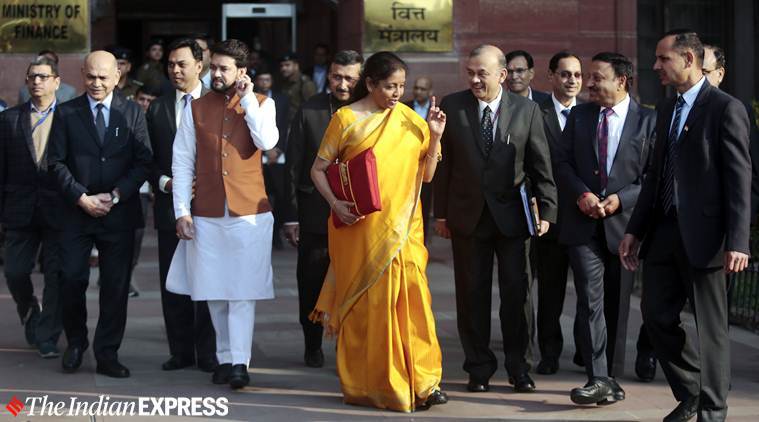 New Delhi: Union Finance Minister Nirmala Sitharaman, holding a folder containing the Union Budget documents, along with her deputy Anurag Thakur and a team of officials, outside the Ministry of Finance. (Express photo: Praveen Khanna/File)
New Delhi: Union Finance Minister Nirmala Sitharaman, holding a folder containing the Union Budget documents, along with her deputy Anurag Thakur and a team of officials, outside the Ministry of Finance. (Express photo: Praveen Khanna/File)
yad yad acharati shresthas tat tad evetaro janah/sa yat pramanam kurute lokas tad anuvartate.
“Whatever action an inspirational entity/man performs, the world follows the same. And whatever standards the same sets by exemplary acts, the entire world pursues.”
What is the context for this shloka from chapter 3 of the Bhagwad Gita? It is in this year’s Union budget. This year’s Economic Survey has argued that the hand of trust is an important enabler for the invisible hand of the market. As the budget has taken important steps to enable the hand of trust, understanding the import of the shloka is crucial. As the age-old wisdom underlying this shloka clearly articulates, mere talk by the inspirational entity/man is not enough. The actual behaviour, as captured in “pramaan” or proof of behaviour, is what inspires the rest of the world.
The Survey introduced the idea that, unlike a public good such as water that gets depleted with greater use, “trust is a public good that gets enhanced with greater use”. In economist speak, trust is a “game” played between multiple parties where trustworthy behaviour is more likely to elicit a reciprocal response. As more entities and people indulge in trustworthy behaviour, the expectation that a particular action can be trusted increases. This is how the greater use of trust enhances its value in the economy. Thus, as people/entities behave in a more trustworthy manner, trust is enhanced disproportionately in the economy.
Trust is depleted disproportionately when people/entities behave opportunistically because the same “game” gets played in reverse. Untrustworthy behaviour elicits reciprocal responses, thereby everyone’s expectations of trustworthy actions decreases. The converse aspect of trust as a public good has been on display for several years in our economy. The boom-bust in the financial sector starting from 2011 was a glaring example of this phenomenon. The arithmetic of the budget had also exemplified this converse phenomenon till now, with non-transparent shoving of extra-budgetary resources (EBR), such as oil bonds or FCI borrowings, into remote corners, combined with unrealistic growth projections and/or tax buoyancy numbers.
In this context, this year’s budget makes a significant departure from the past. First, the budget speech delivered by the finance minister lists the complete list of EBR in an annexure down to the footnote relating to the bonds issued for recapitalisation of public sector banks. Second, the projection of 10 per cent nominal GDP growth is a realistic estimate. Third, the projected tax buoyancy of 1.2 should be achievable. While the projection of Rs 2.1 lakh crore from disinvestment is ambitious, more than half this amount can be achieved in the first half of 2020-21 from the deals that are currently in process but had to be rolled over to the this year. It is legitimate to ask if the ambitious target for disinvestment will be achieved. But, in a year when the delicate balance between fiscal prudence and stimulus for growth had to be achieved, relying on non-tax revenues to fill the fiscal gap makes eminent economic sense.
As described above, trust is a “game” played by multiple parties. As the government has made the first positive move, citizens should now respond positively and thereby build on these gains. In this, if citizens focus on the gains that their positive actions create for the Indian economy as a whole, instead of their narrow private gains, everyone benefits from this positive process. For instance, when many folks break the traffic signal for the private gain of reaching their destination earlier, everyone gets delayed by traffic snarls. However, if everyone focuses on the societal goal of following traffic rules, everyone reaches their destination in time. Similarly, when one large corporate wilfully defaults on its loan, a bank then (rationally) expects that other borrowers are also more likely to wilfully default. To cover the losses from defaults, the bank increases the interest rate on the loan. As a result, every borrower suffers. There are many such instances where untrustworthy behaviour by a minority creates enormous costs for the majority.
Finally, we must acknowledge that “one swallow does not make a summer”. The positive steps in the budget must be followed by more such steps to enhance citizens’ trust. The setting up of a task force to review the statistical infrastructure is a correct step in this regard, even though the Survey finds no evidence of any over-estimation of the GDP growth rate. More such steps are required. For instance, the government must set the example in corporate governance through public sector enterprises, including adhering to all norms for listing in stock exchanges. Similarly, public servants must remember the word “servant” attached to their role and ensure that their actions do justice to the spirit underlying that word.
While trustworthiness may seem a quaint concept to some people in today’s times, ancient wisdom across societies and contemporary evidence — from both the global financial crisis and the financial sector in India — demonstrates its critical importance. Everyone would benefit from paying heed.
The writer is chief economic advisor to the Government of India